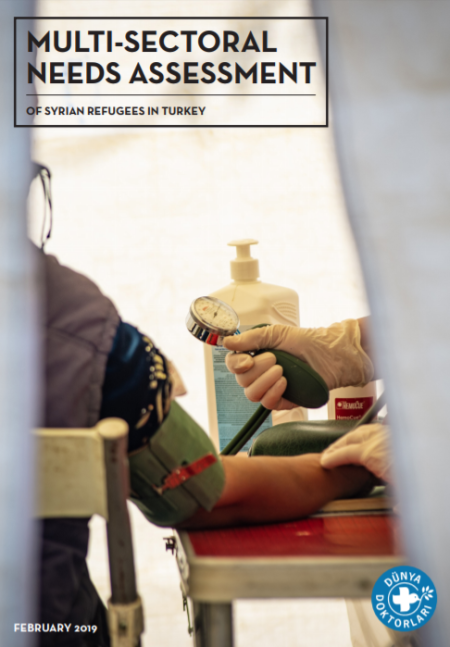More than 5.5 million people have fled the war-torn Syria since the beginning of the 2011-armed conflict. According to the statistics, around 3.5 million of the Syrian refugees - half of them children - now live in the neighboring Turkey.
This study, carried out by Dünya Doktorlar Derneği, a member of the international humanitarian network, Doctors of the World (Médecins du Monde), presents an assessment of the main needs and challenges facing the Syrian refugees living in Turkey.
The multi-sectoral needs assessment is based on a survey involving more than 800 respondents and nine focus-group discussions that took place in early 2019, in both rural and urban locations in Turkey.
The report analyses the current refugee situation and offers a series of recommendations to address the most stringent needs of the refugees. These cover seven main areas that include i) food security and livelihoods (FSL); ii) health plus physiotherapy, mental health and psychosocial support (MHPSS) and nutrition; iii) shelter; iv) non-food items (NFI); v) water, sanitation and hygiene (WASH); vi) protection, and vii) education.
The study notes that many major challenges faced by refugees stem from difficulties they encounter in obtaining legal documents, which would give them access to employment, better household conditions, education and healthcare services. Widespread discrimination and exploitation are some other major impediments for the refugees to an improved life in the host country.
Currently, the Syrian refugee population is experiencing widespread poverty, which is taking its toll on them, especially on the most vulnerable groups such as children, women, and elderly people. According to the study, large refugee groups "live in unsuitable and overcrowded accommodation, often with poor WASH conditions, putting their health at risk."
The study findings also raise concerns about the refugee children who "in particular face higher protection risks, with a large number of refugee households reporting child labour in the community."
Although the problems that refugee populations deal with are similar across the assessed locations, communities living in rural areas are more exposed to risks and exploitations due to harsher living conditions, seasonal employment, reduced physical and financial access to essential needs, or lack of information.
The assessment offers a comprehensive list of provisions and recommendations that may be used as a reference for future planning and programmes developed by governmental or non-governmental stakeholders that work with refugee communities.
On these grounds, some of the recommendations include the provisions of language and vocational trainings to boost the integration of refugees into the job market, increased guidance and support in obtaining civil documents and work permits, awareness-rising on the available food support services, especially for refugees in rural areas, and advocacy to the local authorities on the critical WASH conditions, health, and education access. In addition, the report addresses the awareness about mental health and psychosocial support needs, as they provide a significant basis for refugees' integration, empowerment, reduction of stigma, and enabling access.






